

Creating Participatory Documentaries
In our documentaries we have engaged with project participants as catalysts, advocates and peers to create opportunities for social change through community-centred filmmaking.
The work has focussed on documentary and community development projects in five program areas
- Working with children, youth and families as a force for social change.
- Promoting recovery by challenging stereotypes and systemic barriers with people experiencing substance use and mental health issues.
- Supporting community engagement in health care policies and practices.
- Advocating for affordable housing and safe sheltering policies and practices
- Documenting barriers and exploring alternative approaches to accessing justice, preventing discrimination and advocating for inclusion and equity.
The documentary projects have not been simply filmmaking endeavours. Community development and capacity-building activities were integrated into all phases of our documentary process.
Participants drove the research, filming, editing, test screening, and long-term community dissemination of each documentary.
We formed advisory groups of people who were living the issues that each film explored. When the documentary was completed, we trained the participants to be peer facilitators for community screenings. We travelled to communities, however small or remote, across Canada and worked with local organizations to create opportunities for dialogue and advocacy for the issues that mattered to them.
The facilitation experience allowed participants to reach through despair and isolation, to speak directly and honestly to other communities. For many, it has been their first opportunity to tell their stories while taking a broader look at their common experience – their first opportunity to do real work for real change.
We believe that our personal, collective, and lived experience is the source of the most innovative and effective strategies for systemic change.
The documentaries have supported networks, groups and individuals to take good ideas, grow those ideas, and share their knowledge, experiences and strategies.
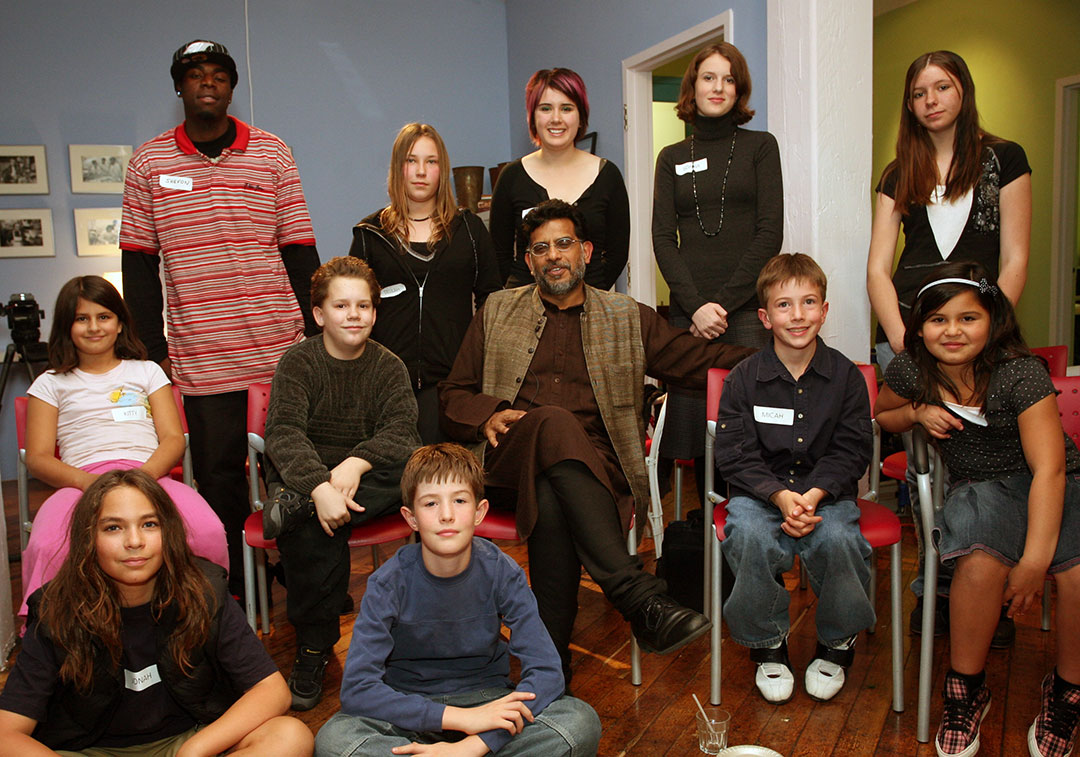
Photo Vincenzo Pietropaolo
Myriam Canas-Mendes and Olga Munoz-Canas
Laura Sky entered our lives and has taken our family on a journey of hope and truth. She and her amazing team embraced my family in such a way that not only did we feel safe in sharing our story, but we no longer felt alone. At our worst moment, overwhelmed by the fear of being homeless, we were treated with disregard everywhere we turned for help. Our story was a shameful secret that we kept from the people in our lives and Sky gave us the opportunity to own our story, begin shedding our shame and restore our dignity. Sky offered my family the chance to speak and be heard and begin a new chapter; the chapter my family now refers to as hope.
Colleen Richards
Participant, Home Safe Toronto
Filmography (1980-2016)
Independent Productions
2014 – Soldiers’ Children – Writer/Producer/Director
2011 – Working Life – Producer/Director
2010 – Recovering Love – Writer/Producer/Director
2010 – Home Safe Hamilton – Co-producer/Co-director
2009 – Home Safe Toronto – Producer/Director
2008 – Home Safe Calgary – Producer/Director
2008 – Living with Miracles – Producer/Director
2005 – Kids Care – Producer/Director
2003 – Crisis Call – Researcher/Writer Producer/Director
2001 – How Can We Love You? – Producer/Director
2000 – Working Like Crazy – Co-director/Co-producer
1999 – My Son the Tattoo Artist – Writer/Director
1996 – Jake’s Life – Co-producer/Director
1991 – The Right to Care – Researcher/Writer/Producer/Director
1990 – Crying for Happiness – Researcher/Writer/Producer/Director
1986 – To Hurt and To Heal, Parts 1 & 2 – Researcher/Writer/Producer/Director
1983 – All of Our Lives (Chacune Sa Vie) – Co-researcher/Co-writer/Co-producer/Director
1980 – Moving Mountains (Elles Soulèvent Les Montagnes) – Researcher/Writer/Producer/Director
Commissioned Projects
2016 – Out of the Box – Co-producer/ Co- director – Sponsor: Ontario Peer Development Initiative
2012 – This Film is About Compassion – Director – Sponsor: Catholic Health Corporation of Manitoba
2007 – Extra Ordinary People – Producer/Director – Sponsor: Central East Public Education Strategy Committee
2007 – Household Work: More Than It Seems – Co-Executive Producer – Sponsor: Margrit Eichler (Ontario Institute for Studies in Education)
2005 – Prescription for Addiction – Producer/Director – Sponsor: Ontario Federation of Mental Health and Addiction Programs in partnership with St. Joseph’s Care Group, Thunder Bay
2005 – Mary Coyne Rowell Jackman: A Person
in Her Own Right – Producer/Director – Sponsor: Nancy’s Very Own Foundation
2003 – It Can Happen to You – Researcher/Writer/Producer/Director – Sponsor: Elementary Teachers’ Federation of Ontario
1998 – Until Someone Listens – Researcher/Writer/Producer/Director – Sponsor: Grandview Survivors Support Group
1994 – Working Lean – Researcher/Writer/Producer/Director – Sponsor: Canadian Auto Workers
1988 – Eight Hours a Day (Huit heures par jour) – Producer/Director – Sponsor: Ontario Women’s Directorate
1988 – A Vision of Dignity – Researcher/Writer/Producer/Director – Sponsor: Federation of Women Teachers Associations of Ontario
1987 – Proud Women Strong Steps – Researcher/Writer/Producer/Director – Sponsor: Women Working with Immigrant Women
1984 – Yes, We Can!
– Researcher/Writer/Producer/Director – Sponsor: Canadian Union of Public Employees
1982 – Good Monday Morning – Producer/Director – Sponsor: National Union of Provincial Government Employees
1981 – Houdaille: Days of Courage, Days of Rage – Producer/Director – Sponsor: Canadian Auto Workers
About The Films
I have always believed in the power of documentaries and in the power of images to encourage people to participate in strategies for social change.
These documentaries give each and all of us the opportunity to speak for ourselves about things that matter to all of us. By exploring real, day-to day experiences of men, women and young people, the films are a reflection of ourselves and our society, and inspire a personal engagement with the issues they raise.
Soldier's Children
2014 – Writer/Producer/Director
The Voices of Children in Military Families Living with Post Traumatic Stress Disorder
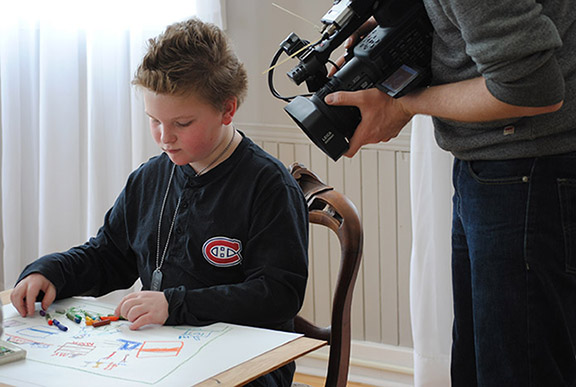
In October 2011, we convened a working group of veterans, a psychiatrist, an art therapist and a documentary film team to create a Participatory Documentary Project that will give Canadians the opportunity to better understand the individual, family and community experiences of people living with PTSD. The group has since decided to highlight the voices of their children, who are so deeply effected by their parents’ experience of PTSD. Together, we have made a commitment to produce a documentary project which will also serve as a forum for participants to express themselves, engage in a healing process and reach out to others in the military, in their neighbourhoods, in their schools, and in their circles of family and friends.
Our research revealed that a number of the young and adult children of military veterans share a wall of silence. Most children in military families link PTSD with shame and confusion. The stigma is so deep, so much apart of their fabric, that they not only hold their experiences and their feelings back from their friends, but they often don’t speak about the daily realities of PTSD within their families.
After working with the family for a number of months, we recently filmed teenage sisters Jessica, 18 and Patricia, 15 and their father, military veteran Louis Leconte. Louis served in Eritrea, Afghanistan and Haiti. Their participation in the filming reflects their strengths and their courage. The sisters both acknowledge that they haven’t talked to each other or to their friends about their experiences of their father’s PTSD. As Patricia told us during our research:
“A couple of my friends know but they just don’t get it. I don’t want them to think that my Dad is a bad person. It’s not his fault. He doesn’t mean it.”
Both young women acknowledge that their father has mood swings and can be volatile. It is clear in this filmed conversation that the young women have empathy for their father’s struggles. When asked about what has made them decide to speak out through this documentary, Jessica tells us:
“To let other people know that it’s OK to talk about it.. that they’re not alone, because you know sometimes you feel like you’re the only one going through this but there’s other people, you just don’t know.”
Patricia adds:
“Yeah, because people keep it to themselves; maybe there is someone else on your street who is going through the same thing, but you just don’t know. It makes you feel different than other people, and you don’t want to seem different.”
While filming, Louis acknowledged his struggle and also his reason for reaching through his own silence:
“I wish – people were not afraid to talk about it. As soon as something doesn’t feel right, I hope that they’re strong enough to go and talk to [a] professional and get some help. Because if they wait too long, you’ll be divorced, separations, you know, alcohol, drugs, all kind of stuff. I don’t know how many times I’ve been thinking about suicide. But because of the kids‚ they give me life as of now. And I thank God for that!”
When asked about the qualities that make their father a good Dad, Jessica smiles, “He really watches over us. Sometimes we don’t like it but sometimes it’s a good thing. And he cares a lot about us. He’d do anything for us.”
This Documentary Project is already promoting a healing process among participants. Kingston psychiatrist Dr. Janet McCulloch, our primary partner on this project, has seen remarkable changes in the families who have been working on this project. In each of the families that include children young or old, there have been significant breakthroughs in the way that they relate to each other and a new optimism about the possibilities of healing and recovery. As examples, Andy, a 32 year military veteran has reconnected with his son and held his grandson for the first time. Rick renewed long stalled conversations with his 3 adult children. Louis, Jessica and Patricia have understood more about each other, and are sharing the pride in each other’s courage to speak out.
Working Life
This documentary includes the stories of four people who have grown up with a parent who has experienced mental health difficulties. While their relationships with their parents have led to their own struggles they have also been a source of strength and skills that have helped them navigate their working lives.
The documentary is part of a Working Life Tool Kit that includes additional interviews with resource people, a Trainers’ Guide and other resources.
A Documentary Tool Kit about mental health in the workplace
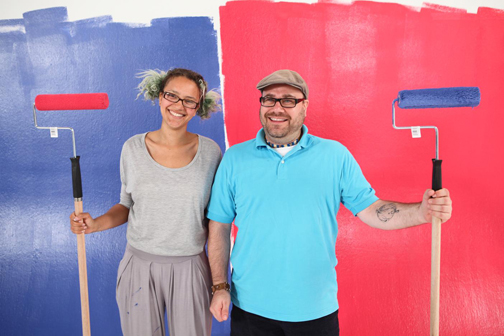
Working Life introduces us to four adults who grew up in families struggling with mental health difficulties. They reflect on some of the challenges facing their parents, both as parents and as breadwinners, and how their experiences shaped their own goals and expectations.
Recovering Love: Mothers, their Families, Drugs, and Alcohol
2010 – Writer/Producer/Director
“You’re not the only one going through it. There’s other people, even though you might feel like you’re alone, you’re not‚..I’m reaching for the stars… no fear of my expressions, and understanding more about mom’s addiction. Hopefully, me and my mom and my brother will be closer‚..” – Rebecca, Film Participant
Recovering Love peels away the layers of prejudice and punishment that confront women, especially mothers‚ who are dealing with addiction. This documentary shows the impact of that condemnation, but also looks deeper into the systemic issues that lead to addiction in the first place, including trauma and abuse, racism, and discrimination.
This is a documentary about women who are deeply committed to their relationship with their children and who are also committed to recovering from their addictions. The documentary includes the wise voices of their kids who have experienced their mothers’ substance use and who are so much a part of their mothers’ reclaiming their hopes.
The women in the film are recovering their love for themselves, for their children, and building their capacities to love and support each other. They have benefited tremendously from the support of their families, co-workers, front line advocates and their communities.
Key audiences for this documentary will include women dealing with substance use, their families and co-workers, as well as child and family support and social service agencies, health care programs, children’s aid programs, schools and colleges, the courts, prisons, lawyers and the police. Recovering Love is designed to inform and encourage these audiences to understand and support women and their families.
Recovering Love is designed to inform and encourage these audiences to understand and support women and their families. This is a film that educates the heart as well as the mind.
THE STORIES
We meet several women at a family weekend retreat hosted by Iris Addiction Recovery for Women outside of Sudbury, Ontario.
Aline is a substance abuse counselor whose work is informed by her own journey through recovery. She used alcohol to mask the pain of childhood sexual abuse.
Lynn lived with the pressure to be the perfect wife in a marriage that wasn’t working. Her recovery “has given her back Lynn”.
Phyllis is a self-described middle class woman who has hidden her pain behind the appearance of strength. Her adult daughter Valerie loves her mother, but feels that she doesn’t know her. They are in the process of finding honesty and connection.
June talks about the stigmas she experiences as a black woman dealing with addictions and particular discrimination experienced by women who live in social housing.
Natalie is very honest about the benefits and losses in her use of drugs and alcohol. Her sister, Nicole, has come to the retreat to support her.
Angela lost her nursing license 12 years ago because of her use of narcotics and is hoping to re-establish her nursing work. She is working her way through shame and guilt.
Teenagers Cassy and Rebecca speak honestly from their perspectives about their mothers’ substance use, and their needs and hopes.
Amanda is an Aboriginal woman. She recognizes the legacies of her identity, and shows us the strength and perseverance in rebuilding her life.
At the Jean Tweed Centre for Women and their families in Toronto, we are introduced to the Pathways to Healthy Families Program. Here, we meet two young mothers, Annie and Grace, who have fought with love and tenacity to reclaim their children who were apprehended by children’s aid societies.
Grace felt discriminated against on the basis of her young age. She was determined to find advocates and support in her efforts to reclaim custody of her son. Annie felt stereotyped because she is an Aboriginal woman. She reached out for support in her efforts to keep her baby safe, facing profound disappointment and grief until she found the right support agency.
Both women speak to the enormous difference the support of counselors, advocates and parenting programs have made to their healing process and their opportunities to parent their children.
FUNDING FOR RECOVERING LOVE HAS BEEN GENEROUSLY PROVIDED BY
Ariadne Women’s Chamber Choir of Sudbury, CAW Mining Council, CAW National, The Charles and Lillian Dobson Charitable Foundation, IODE (in Sudbury), Iris Addiction Recovery for Women, The Jean Tweed Centre, Knights of Columbus (Val Caron), Laurentian University’s Student General Association, Laurentian Publishing Limited, The F. Jean MacLeod Trust c/o Tom Maki, The Henry Melnychuk Memorial Trust Fund c/o Tom Maki, Laamanen Construction, Mine Mill Union (Local, National and Mining Council), Pioneer Construction, Sheet Metal Workers, Local 504, Sudbury Mine Mill & Smelter Workers Local 598/CAW-TCA Solidarity Fund, United Steelworkers of America, Vale Inco, Xstrata Nickel.
Laurie Bissonette, Robert and Catherine Bourgeois, Raymond Coutu, Jo-Ann Hannah, Helen Helpert, Patricia Hennessy, Maureen Lacroix, Diane Massicotte, Denis Mayer, Gilberte L. Renaud, Lyne Robidas, Toula Sakellaris, Carolyn Sinclair.
Home Safe Hamilton
Home Safe Hamilton is the third film in SkyWorks’ Home Safe documentary series, which deals with how Canadian families with children live with the threat and the reality of homelessness.
The film examines systemic roots of homelessness as a consequence of economic restructuring, discrimination and displacement. It includes stories of steelworkers affected by industrial layoffs, high school students living in poverty, new Canadians and Aboriginal families.
THE STORIES
The Hamilton region as been synonymous with steel-making and for generations has been at the centre of Ontario’s industrial heartland. But living out the cold requirements of globalization, Hamilton and its people are now living with job loss, economic insecurity, and the reality or threat of homelessness. We meet steelworkers laid-off and locked-out at the nearby Nanticoke plant. Shannon Horner-Shepherd, a laid-off worker, is now working to help her colleagues survive the current economic pressures. She is determined that community solidarity will prevail in the face of long-term economic change.
Hamilton is the largest centre for newcomers in Ontario. Though many arrive full of hope, they are often devastated by the obstacles that keep them from adequate employment and housing, discrimination, language vulnerability, and the effects of traumatic displacement. Shamso Elmi works hard to help Somali families deal with their desperate housing conditions in the private rental market.
Tuyet and Ynhi, students at Sir John A. MacDonald Secondary School (with the largest population of students below the poverty line in Ontario), have chosen to speak out about their needs for support and to encourage other students and teachers to break the silence that grows from the shame of poverty.
We also meet two Latin American refugee families at The Good Shepherd Family Centre where they have found, not only a warm welcome and continuing support, but a family centre that stands as a model for how communities can and should be responding to the reality of family homelessness.
Home Safe Hamilton features a large urban Aboriginal population who are committed to establishing their cultural identity and place in the city. Many are originally from the nearby Six Nations community, the largest First Nation in Canada, but have come to Hamilton for employment and educational opportunities. Housing at Six Nations is limited and Amy Lickers, their community planner, speaks of her community’s effort to provide affordable housing.
Home Safe Toronto
Home Safe Toronto is the second film in SkyWorks’ Home Safe documentary series, which deals with how Canadian families with children live with the threat and the reality of homelessness. It shows how the housing crisis in Canada is an expression of the increasing economic and job insecurity that has devastated the manufacturing sector in the Greater Toronto Area and throughout southern Ontario. The film reveals the consequences of this “new economy”, where families surviving on low wages with no benefits, or on dwindling social assistance, are faced with the terrible choice between keeping a roof over their heads or putting food on the table.
For families in economic crisis, the threat of losing safe and secure housing lives out in many ways. Some families are forced to relinquish their homes and double-up with friends or family. Others rush to sell their homes before the bank forecloses on their defaulted mortgages. Tenants who are financially vulnerable are stretched to pay too much rent for sub-standard housing, or face the threat of an eviction notice. Some must resort to seek refuge in shelters.
STORIES THAT CONNECT US
Home Safe Toronto reveals how close homelessness is to so many of us. The participants who share their experiences are hard-working, hopeful Canadians who have followed the rules and done their best to achieve modest dreams.
Rose and her husband both work, yet after twenty-eight years in Canada Rose and her family are unable to escape the cramped confines of a family shelter. Debbie struggles to cover the monthly rent on her less-than-minimum-wage job with a cleaning service, while her daughter Phaon helps out with her paper route. The Taylors and the Richards are two families sideswiped by the collapse of the Ontario auto sector, a calamity that makes little distinction between unionized and non-unionized workers. The Taylor sons, Ryan and Shane, Phaon and her best friend Jocelyn, and students from Toronto’s Voice School all talk about homelessness from a kids’ perspective, revealing disappointment with their society as well as their hopes for the future.
But while some stories are wrenching, others offer inspiration and hope. René and Miryam are single moms whose experiences of homelessness and poverty have made them passionate and determined advocates for the rights of others. And at the CAW Chrysler Action Centre and the PMP Workers Action Centre, we meet laid-off employees who have banded together to support each other through a period of profound insecurity and stress.
Together, their stories open our eyes and our hearts and inspire a new determination to end homelessness in Canada.
Home Safe Calgary
It is estimated that there are currently 22,500 children in Canada who are homeless. Home Safe Calgary is the first of four documentaries from SkyWorks that focus on children and families who experience poverty and homelessness. It reveals the contrast between the promise of Calgary’s booming economy and the vulnerability of those who seek a place in it – where even parents with decent-paying jobs are unable to put a roof over their family’s heads.
Home Safe Calgary was researched and produced with the children and parents who appear in the film. It reflects their experience and thoughts about what it will take to end homelessness in their city. It will challenge audiences to shift from sympathy and charity to advocating for affordable housing and adequate shelter systems.
The Home Safe project is led by award-winning filmmaker Laura Sky, and by author, advocate and Street Nurse Cathy Crowe.
The Participants
Delilah shares her experience of shelter life, the consequences of homelessness on her family life, her school life, her friendships, and her dreams. She is remarkably thoughtful and compassionate and as a result of her homelessness, she came to recognize and challenge her own prejudices. She challenges us to do the same.
Tasha is Delilah’s committed mother who, like other parents we meet in the film, tries to absorb the effects of homelessness on her children. She protects them from the despair of their homelessness, infuses them with optimism, and reminds them that they are still a family, but temporarily living with other people.
Rowan is also 12. He is bright, articulate, and Delilah’s very good friend. They have both been teased by school mates, lived through similar hardships, and those experiences have sustained their friendship. Rowan has an analysis of the causes of homelessness in Calgary, and some pretty clear ideas about solutions.
His mother, Jen, is a mother bear, a smart, clear-minded woman, wise in the ways of surviving poverty and what she and Rowan call financial homelessness. Jen home-schools Rowan and his education includes issues of justice and fairness.
The Discovery House Girls Group includes three 5 and 6 year-olds who together draw and play out their experiences of homelessness. Each of their mothers is seeking refuge from violent relationships. Their children’s play and self-expression reflects their longing for security and safety and reaches out to all of us.
Their moms talk about their experience of good sheltering, as the staff and programs at Discovery House help them to rebuild their lives. They talk about the “shelter gridlock” in Calgary that inhibits families from transitioning from shelter settings to affordable housing.
At Discovery House we also meet an 8 year-old boy who plays and talks, wishing he could build a very big house for people who are homeless and poor, starting with his family. His mom just wants a place in the Calgary community without being judged or discriminated against as a single mother in economic hardship.
Darla and Kaitlan are young single moms, whose children are under 2. Their supportive friendship helps them to rebuild their lives. Each has gone back to school, and each is committed to building secure and safe lives for their daughters. They fight discrimination daily – from their own families, their peers, and their communities.
Living with Miracles
2008 – Producer/Director
This film introduces us to a group of unforgettable young people who are dealing with complex medical needs while living at home. Through their insights about disability, autonomy and the quality of their lives, the young people create a powerful tool for challenging discrimination. The children, youth and their families speak out about navigating their journeys from institutional care to their homes. They show us their experiences of supportive but complex care in their families, at school and in their communities.
As a documentary, Living with Miracles does more than reveal the needs and obstacles for the participants. It highlights the strength and resilience exemplified by the kids and the people who love them.
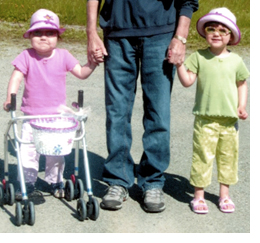
Living with Miracles introduces three unforgettable kids dealing with complex medical needs while living at home. Through their insights into disability, autonomy and quality of life, the children create a powerful tool for promoting public awareness and battling discrimination. They, along with their siblings and parents – speak candidly about their lived knowledge of the systemic obstacles they face, and provide ideas about how communities and health care professionals can help to accommodate their needs.
Our 1984 film To Hurt and to Heal, we explored the issues of caring for very premature and critically ill children. Living with Miracles returns to the lives of children who began their lives with difficult medical conditions, bringing their voices and experiences to our base of understanding. Living with Miracles highlights the strength and resilience exemplified by these incredible kids and the people who love them.
The Stories
EMILY CHAN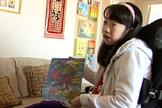 “I know that people know that I’m in a wheelchair because it’s visible and I’m used to people watching me and wherever I go, but I don’t really care because this is what makes me, me. Maybe on the outside maybe we look different, but on the inside we are all just the same. We all have feelings.” -Emily Chan
“I know that people know that I’m in a wheelchair because it’s visible and I’m used to people watching me and wherever I go, but I don’t really care because this is what makes me, me. Maybe on the outside maybe we look different, but on the inside we are all just the same. We all have feelings.” -Emily Chan
Emily was born in Toronto and spent much of her early life in hospital. From the age of one month to six years, she lived at the Bloorview Macmillan Rehab Centre for Kids. We meet her and her parents when she is 12, now living at home. She is in a motorized wheelchair and breathes with the assistance of a ventilator. She talks about her experience, her strengths and her awareness of discrimination at school and in the community.
CATHERINE MONPETIT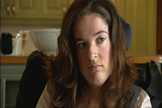 “I’ve been very sick for a very, very long time, and the role of parents, it’s to protect and love, and they don’t want anything to happen, and no pain. Of course they are really good intentions when they do that, but sometimes, it’s that I need my independence, you know, to explore myself because if I stay always in the house, in four walls, it’s not going to be good for me. I will not be prepared for the real world.”
“I’ve been very sick for a very, very long time, and the role of parents, it’s to protect and love, and they don’t want anything to happen, and no pain. Of course they are really good intentions when they do that, but sometimes, it’s that I need my independence, you know, to explore myself because if I stay always in the house, in four walls, it’s not going to be good for me. I will not be prepared for the real world.”
Catherine is in her late teens and lives at home with her parents and 3 brothers after many long stays at the Montreal Children’s Hospital. She is very intelligent, articulate and thoughtful, provoking important discussion with her family. She struggles with the limitations of a special school setting and is adamant about finding schooling that is challenging and rewarding, in her search for independence and autonomy.
THE CAYA FAMILY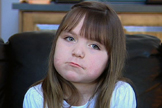 “It’s kind of hard, having a sister like her because she has to go to the hospital so much. And it’s usually Mum that goes with her‚ I miss them when they’re in the hospital and stuff and, like, whenever she has a surgery or something”. – Alexander Caya
“It’s kind of hard, having a sister like her because she has to go to the hospital so much. And it’s usually Mum that goes with her‚ I miss them when they’re in the hospital and stuff and, like, whenever she has a surgery or something”. – Alexander Caya
Gabriella Caya was born with a complex medical condition that resulted in 13 surgeries, many emergency interventions and required daily medical monitoring. Her twin Madison, her brother Alexander and their parents each talk frankly about their experiences of Gabriella’s medical needs.
A CONVERSATION WITH GABRIELLE’S PARENTS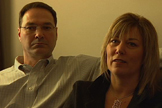 “As a parent and adult you understand what they are doing to her and it’s hard to let them do that‚ you know, it’s bringing harm, you know, the procedures hurt….And you couldn’t hear her because she had a tracheotomy tube so when she cried you could see her tears but‚ you couldn’t hear her”. -Mario and Heather Caya
“As a parent and adult you understand what they are doing to her and it’s hard to let them do that‚ you know, it’s bringing harm, you know, the procedures hurt….And you couldn’t hear her because she had a tracheotomy tube so when she cried you could see her tears but‚ you couldn’t hear her”. -Mario and Heather Caya
Heather and Mario Caya discuss their experiences of Gabriella’s birth and their family lives built around the needs of all 3 children.
Would Gabrielle have such a magnetic spirit, quick temper and tomboy tendencies if:
- she hadn’t been born in a body with Beckwith Wiedemann Syndrome?
- she hadn’t had to fight for every breath before being trached and many times after
- she hadn’t been loved and cuddled by so many special medical staff? They were drawn to her beautiful eyes and will to live.
- being dependent on medical technology wasn’t part of her day, every day?
- she hadn’t fought so hard against all of the iv’s, bloodwork and surgeries?
- she hadn’t seen that only her brother was free from the testing and medical attention?
- she hadn’t asked me so many times why God made her this way, why wasn’t she normal? I have heard over and over, “I don’t want to be special; I just want to be like everybody else.”
- we hadn’t spent hours, days, months and years of holding through the darkest days, celebrating our big milestones and just loving through the tears?
-Heather Caya, Gabrielle’s Mother
Kids Care
2005 – Producer/Director
“We all have something in common. We’ve all lost a family member or friend to cancer. We are all at different ages and stages of our lives. We’ve come to understand that by helping each other, we’ve been able to help ourselves. We hope this film helps others, too.”
– Kerri Ford, age 16
Kids Care addresses the issues and needs of young people who have lost a loved one to cancer. The documentary features a memorable group of young people, each dealing with the death of a parent, sister, cousin or best friend. The participants, some as young as 8, others in their teen and early adult years, talk candidly about their experiences. They explore their hopes, and their search to re-establish ‘normal’ while learning to live with their loss. They also describe what friends, parents and teachers can do to help kids cope with feelings of fear, anger, isolation and sadness.
Much of Kids Care was filmed at Camp Oochigeas, a residential camp for children affected by cancer, in Ontario’s scenic Muskoka Lakes region. Producer-director Laura Sky documents some sad moments with the film participants, as well as some very enjoyable times in this safe and peaceful place. The Muskoka setting also makes for a visually beautiful film. But what is most striking is the instant bond of understanding that develops among the kids, regardless of age, culture or background. Six months later, Sky catches up with some of them to see how they’re doing and to learn what approaches have helped them begin healing. They speak to us directly, clearly and courageously.
Kids Care offers bereaved young people, their families, friends, teachers and caregivers the tools to start talking; by sharing stories and thoughts, offering support and above all, connection. Most importantly, Kids Care shows how kids can help other kids deal with loss and grief.
This documentary was inspired by SkyWorks’ 2001 film, How Can We Love You? which profiled two women living with metastatic breast cancer. Audiences who saw that film often expressed concern about the needs of children in families experiencing cancer.
Made by kids for kids: The kids who appear in Kids Care contributed during every phase of the project, from research through to the final edit. They are also resource people and peer facilitators at community screenings. SkyWorks wishes to thank the Kids Advisory Group and the Adult Advisory Group for their commitment to this project.
Kids Care’s key production partners are: Bereavement Ontario Network, Camp Oochigeas, the Pediatric Oncology Group of Ontario, Sudbury Regional Hospital ‚Äì Supportive Care Program, Wellspring, Willow Breast Cancer Support and Resource Services and Working Women Community Centre, Breast Cancer Education Project for Immigrant and Refugee Women.
Ronald McDonald House Charities is the national tour sponsor of Kids Care. The Ontario community tour has been made possible through the generosity of The Lawson Foundation.
The Kids Care Project won the Henry Hampton Award for Innovation and Excellence in Film & Digital Media. The award was bestowed by the Council on Foundations based in Washington D.C. in 2007.
Crisis Call
What happens when the boundaries between policing and mental health care disappear…. when the police become our new frontline health care workers?
Crisis Call addresses a critical issue affecting the police, psychiatric survivors, legal experts, mental health workers and the public. The starting point for this unique documentary is the story of Edmond Yu, a psychiatric survivor in crisis who was shot and killed by Toronto police after a 1997 altercation on a city transit bus.
Award-winning producer-director Laura Sky asks, is there any way to prevent a mental health crisis from escalating into violence? For answers she looks to the police, psychiatric survivors, and to many others involved in crisis interventions. Crisis Call documents their candid, often compelling stories as they challenge the current system and search for solutions.
How Can We Love You?
How Can We Love You is the documentary story of Mary Sue Douglas and Jan Livingston, two women with metastatic breast cancer who travelled across North America with a community theatre troupe performing the play Handle with Care? This innovative play dramatized findings from research studies involving women with metastatic breast cancer and the oncologists who treated them. (Metastatic cancer is cancer that has spread to other parts of the body and is treatable but rarely curable.) The play’s cast included women with breast cancer, researchers from the Toronto-Sunnybrook Regional Cancer Centre and actors from Act II Studio at Ryerson Polytechnic University.
Filmmaker Laura Sky takes us behind the scenes in this compelling documentary to explore the personal stories of Mary Sue and Jan as they perform their stage roles, deal with the treatment of their cancers and live their everyday lives. How Can We Love You brings us face to face with the daily struggles and pleasures of these women. Mary Sue and Jan talk frankly about their own feelings of mortality; and about their joy and fulfillment in making a difference for other women in the same situation.
How Can We Love You makes us think about the issues faced by women with breast cancer. It also addresses the concerns of those who love and care for them: friends and family, the health care community and women’s health advocates. Most importantly, this film gives an unprecedented voice and presence to women with metastatic breast cancer.
Mary Sue Douglas lived with cancer for 14 years and with metastatic breast cancer for seven and a half years. She was a tireless advocate for women with breast cancer until her death on March 31, 2002. Mary Sue is survived by her husband Peter in Toronto and three adult sons, all of whom were part of the documentary. Jan Livingston became ill during the making of How Can We Love You and died in fall, 2000. A single working mother from Orillia, Jan too, was an advocate for women with breast cancer. She leaves her adult daughter, Nadine, who is also in the documentary. How Can We Love You? is dedicated to the memory of Mary Sue and Jan.
Working Like Crazy
2000 – Co-director/Co-producer
Working Like Crazy (1999)
Most psychiatric survivors who’ve been through the mental health system face poverty, housing challenges and unemployment. But the six who are profiled here have survived by creating their own jobs, training and support systems. These productive people are part of a unique community overseen by the Ontario Council of Alternative Businesses.
Participants
Laura Hall’s incredible journey has taken her from the isolation of a psychiatric hospital to executive director of a courier business.
Diana Capponi has transformed the grief and rage of family violence into a passion for justice as the director of the Ontario Council of Alternative Businesses (OCAB).
Courier Susan Ashby’s love of animals has transformed her in the eyes of the neighbourhood children from the “cuckoo lady” to the “rat lady”, a title she much prefers.
Patricia Fowler is surprises to have lived into her 40s. But she has fought a crushing sense of worthlessness to become indespensable as OCAB’s administrative assistant.
Scott Benness was told by the vocational rehabiltation counsellors that he could do nothing. Now he’s proving them wrong.
Graham Brown uses his work to fight against depression and sleeping his life away. It’s all part of his plan, “the plan to get back to being a man.”
My Son the Tattoo Artist
1999 – Writer/Director
My Son the Tattoo Artist
A film about the choices our adult children make which shape their lives; how those choices are formed and how parents respond to them. Laura Sky’s most personal film.
The Right to Care
1991 – Researcher/Writer/Producer/Director
The Right to Care (1991)
A film about nurses working on the front line of our health care system.
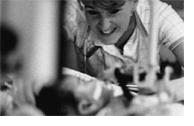 The Right to Care addresses some of the major dilemmas nurses face in the right to quality health care today. The voices of nurse caregivers are heard as they face intricate issues and actual life experiences. This film is stimulating, thought provoking and raises debate among viewers as to major issues in our health care system.
The Right to Care addresses some of the major dilemmas nurses face in the right to quality health care today. The voices of nurse caregivers are heard as they face intricate issues and actual life experiences. This film is stimulating, thought provoking and raises debate among viewers as to major issues in our health care system.
This film can be used in nursing, health care administration, women’s studies, labour education, medical and nursing ethics, economics, sociology and political science.
“A must see for the public. It shows the compassion and concern that has made all nurses vulnerable to exploitation. For nurses, it tells us that acknowledgement of our caring and sharing our concern will unite us to take charge of our profession.”
– Jo Field, R.N., Hospital staff nurse
This Film is About Compassion
2012 – Commissioned by Catholic Health Corporation of Manitoba
This Film is About Compassion (2011)
The documentary This Film is About Compassion documents relationships experienced in health and human service organizations.

The film, in four chapters, paints a portrait of the journey toward compassion through the eyes of residents of a personal care home, patients in a palliative care unit, individuals taking part in a bereavement group and individuals living with developmental disabilities, their family members and caregivers. The film and guided discussions ask what it takes to authentically support and renew compassionate practices and how this human capacity and need can best be nurtured. The film is designed to acknowledge both the joys and the struggles of compassion to move us to positive action within our environments.
Other Films
Jake's Life
Jake was born with severe developmental deficits and was not expected to live to see his second birthday. The film finds him when he is six, with his devoted family and community celebrating his bar mitzvah prematurely. We can see that he is a loved child, and is responsive to light, to sound and to the hugs and kisses in his everyday life. His parents come to the very difficult decision to find a loving second home for Jake, so that he can get all the benefits of trained and committed care givers. Parents Miriam and Jim talk to audience members about the gaps in government support that make good alternative care so difficult to sustain. This is, indeed, a family no less loving for the decision they have made to provide Jake with a second home.
Crying for Happiness
Filmed on location at Toronto’s Baycrest Centre for Geriatric Care, the documentary introduces the audience to a group of older women who are experiencing depression and attend a Day Hospital Program.
The documentary was created with the participation of the women, who formed a voluntary film group. Together with director Laura Sky, they decided how their lives would be represented on film. Participants had access to immediate playback of all their interviews and conversations. These portions of the film were edited at the hospital in order to maximize consultation as the film was being made.
The clinical team involved in the film is seen discussing their vision of the program as well as their ethical dilemmas. The team discusses specific patient issues only when given consent by the patients.
Crying for Happiness raises issues, asks questions and provokes discussions at all levels of the health care sector. The film examines the ethics of the consent process, patient and staff autonomy, and accountability. In three parts, the film can be shown separately or sequentially.
To Hurt and To Heal, Parts 1 & 2
This award winning two part documentary focuses on six portraits of children, their families and health care professionals – all dealing with paediatric medical crisis. All participants have experienced the day to day ethical dilemmas in paediatric and neonatal Intensive Care Units and, consequently, in the post hospitalizations lives of the children and their families.
The doctors, nurses and parents speak about the conflicts and contradictions that inform the suffering and healing inherent in the children’s medical care.
This documentary was researched and filmed over a three year period in five teaching hospitals in Quebec and Ontario,
All of Our Lives (Chacune Sa Vie)
Co- directed with Helene Klodawsky, Produced by the National Film Board.
This award winning documentary explores the lives of six women in their older years. They weave their memories of their inner lives, revealing their hopes, their disappointments, and their strengths. The documentary weaves together archival footage, re-enactments of their recollected moments with evocative original music and powerful images.
Moving Mountains (Elles Soulèvent Les Montagnes)
Moving Mountains was a ground breaking documentary about ground breaking women who were the first women coal miners in Canada. The film is lively, gripping and a tribute to the women who operated the biggest mining equipment in the country. Audiences witness their courage, their strengths as they each confront the obstacles that have so long kept women from work traditionally awarded to men only. The original music in the film sets the pace, the women are great story tellers, This is a film that will engage girls and women from 6 to 106 years of age.
Extra Ordinary People
Commissioned by Central East Public Education Strategy Committee
This compelling documentary looks at the impact of discrimination experienced by people living in recovery from mental health and substance use issues. The documentary explores portraits of diverse participants who talk about how they have reclaimed their lives through the encouragement of peer support programs. Their shared responses to their experiences illustrate a shift attitude in mental health programs that regards recovery as an achievable outcome rather than simple accommodation.
Prescription for Addiction
Opioid addiction is a health and social crisis which crosses all social, economic and cultural boundaries. Whether is begins with efforts to treat pain, or through the use of illegally obtained opioid drugs, the consequences can be devastating for individuals, families or communities.
This documentary (P4A) is appropriate for a wide range of audiences, including front line health care and substance use counsellors, safe injection site staff, volunteers and participants, families, advocates, law enforcement agencies, First Nations communities.
P4A opens the door for people to talk about this issue which is affecting individuals and communities across Canada. The documentary participants offer hope to support others struggling with opioid use and much needed awareness for all those who care about this potentially deadly issue.
Mary Coyne Rowell Jackman: A Person in Her Own Right
Commissioned by Nancy’s Very Own Foundation
This film documents the life of Mary Coyne Rowell Jackman. Born in 1904, Mary ‘s commitment to her faith and to social justice was life-long.
Ahead of her time, Mary worked to build an equitable society She was a passionate nationalist and both her domestic and public life reflected this. Often contrary to current trends, Mary’s artistic sensibility and commitment to Canadian art contributed enormously to the recognition of Canadian artists Her contributions are still being felt across the artistic world in Canada.
Strongly influenced by Virginia Woolf’s A Room of One’s Own, a gift from her mother on her wedding day, Mary worked tirelessly to assert her independence while influenced by the traditional family values inherent in her wealthy community.
Commentary by several of Mary’s contemporaries, archival photographs and footage of the times and thoughts from her children make it clear to the viewer the extraordinary woman and force that she was.
Until Someone Listens; Recovering from Institutional Abuse
1998 – Researcher/Writer/Producer/Director
Commissioned by Grandview Survivors Support Group
This documentary enters the lives of a representative group of women from the Grandview Survivors Support Group and chronicles their experiences in the passage from trauma to recovery. Their contributions provide insight for those who have had similar experiences and for professional staff who work with abused women and children. The documentary’s purpose is to promote individual and collective healing and to increase community awareness of institutional abuse. As well, it challenges community stereotypes about abuse and recovery.
Each documentary chapter features a Grandview survivor whose experience reflects particular steps or a different point on the path towards healing. Although Grandview girls experienced similar sexual, physical and emotional abuse, each has developed her own survival skills and has often shared her skills with others. Many benefit from the support of others – therapists, family, intimate friends and partners. Others choose more solitary journeys.
The film is accompanied by this users’ guide.
Working Lean: Challenging Workplace Re-organization
Commissioned by Canadian Auto Workers
This film documents Total Quality Management systems- the fundamental change to the organization of industrial work– and explores the workers’ response to these global management systems.
Originally developed by Toyota, Kaizen is a management strategy that currently dominates private and public service workplaces. Kaizen fundamentally changes the way that we work. The goal is to reduce the number of workers, to pressure workers to work harder, accomplishing their tasks in less time. This allows private and public corporations to use worker knowledge and expertise to maximize profits or institutional budgets by decreasing labour costs. Workers are seduced by the promise of working smarter, having input into problem solving and prevention. This is the elixir for workers hoping to be heard, wanting to make a difference to their experience of work.
We explore three industrial workplace and meet the people who work in these systems. Later we come to understand that these systems dominate public services, health care institutions as well as private sector work sites. Audiences realize what the workers do and what has changed in their work. Many participants shared their new insights One person who explains that they realize they had no choice but to accede to change, just to keep the work, and the jobs. We learn that by achieving their stated goal, that all had worked towards, their efficiency often lost them a co-workers job. A questionable achievement, but and a rude awakening as to how Kaizen ultimately works. To have such a job, or perhaps to not have a job at all, if they had kept the old way of working.
This discussion among participants captures the lifeblood of the people who are living in the centre of the changing workplace- changes that their futures. They want to be heard.
Proud Women Strong Steps
Commissioned by Women Working with Immigrant Women
Yes, We Can!
Commissioned by Canadian Union of Public Employees
Good Monday Morning
Commissioned by National Union of Provincial Government Employees
